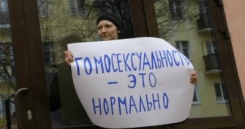BY NATASHA BARSOTTI – The United Nations Human Rights Committee (UNHRC) has found the Ryazan Law on Administrative Offences prohibiting “public actions aimed at propaganda of homosexuality among minors” to be discriminatory and a violation of freedom of expression in the case of a queer rights activist who was convicted under the law’s measures. ![]()
In March 2009, Irina Fedotova displayed posters declaring “Homosexuality is
normal” and “I am proud of my homosexuality” near a secondary school in Ryazan. She was arrested, convicted and ordered to pay a
fine of 1,500 rubles. Fedotova had lost her appeal to the district court, and the Constitutional Court ruled that prohibition of information that was “capable of harming health, morals and spiritual development, as well as forming perverted conceptions about equal social value of traditional and non-traditional family relations” could not be considered a violation of the right to freedom of expression, a joint ILGA-Europe and International Commission of Jurists (ICJ) release notes.
But the UN committee found that Russia “has not shown that a restriction on the right to freedom of expression in relation to ‘propaganda of homosexuality’ – as opposed to propaganda of heterosexuality or sexuality generally – among minors is based on reasonable and objective criteria.”
It found Russia had violated the International Covenant on Civil and Political Rights, of which it is a signatory, in the areas of freedom of expression and discrimination.
“Fedotova’s actions were not aimed at involving minors in any particular sexual activity. Rather, ‘she was giving expression to her sexual identity and seeking understanding for it,’ the committee notes. It has now ordered the Russian Federation to reimburse the fine paid by Fedotova as well as pay her legal costs and to ensure that the relevant provisions of domestic law are made compatible with articles 19 and 26 of the Covenant.

“In its decision, the Human Rights Committee also emphasized that limitations
for the purpose of public morals, which are derived ‘from many social,
philosophical and religious traditions,’ could not be based exclusively
on a single tradition,” the ILGA/ICJ release also states.
Apart from Ryazan, about nine other regions in Russia have now adopted legislation banning “homosexual propaganda,” gay rights activist Nikolai Alexeyev recently told Xtra.
“Domestically, I think eventually Russia will have to limit the manner in which these laws are applied, for example in terms of demonstrations or Pride marches, although I don’t believe they will be repealed,” Alexeyev told Gay Star News in the wake of the UNHRC’s decision.
“It may well ‘cool down’ the desire of Russian politicians and religions to pass similar laws, and also prevent such a law to be passed on a federal level,” he says, adding that “it has also enormous importance for combatting other countries that have or are planning to pass similar laws, for example, Lithuania and Ukraine.”
Recently, an impatient judge also acquitted pop star Madonna of “brutally violating” St Petersburg’s anti-gay gag law following a concert tour in which she spoke out against the measure, handed out pink wristbands and urged the crowd to show support for queers.

 Why you can trust Xtra
Why you can trust Xtra


